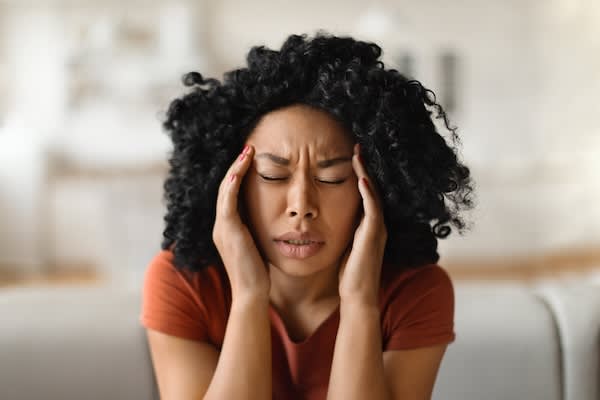Chronic migraine relief and support

[5 MIN READ]
In this article:
-
Chronic migraines are when you experience headaches 15 or more days of the month with at least eight of them having migraine features.
-
It’s important to have a consistent routine, since stress and disruption in the sleep/wake cycle can trigger a migraine headache.
-
Anti-CGRP medications are some of the most effective in treating and preventing migraine symptoms.
Chronic migraine relief: Your guide to support
If you know, you know: The debilitating headache pain, the sensation as though a helmet on your head is getting tighter and tighter, the need to crawl into a dark space and stay there for hours, the nausea that makes you feel like you’re going to throw up.
Migraines affect at least one in every seven adults worldwide, making it one of the most debilitating diseases on the planet. But if you suffer from chronic migraines, there is hope. Learn more about this condition and promising new migraine treatments that can relieve suffering and give you a better quality of life.
What are chronic migraines?
“Chronic migraines are diagnosed when an individual experiences headaches 15 or more days per month for more than three months, with at least eight of those days exhibiting migraine characteristics,” says Farzaneh Khezri, M.D., a Providence neurologist who sees patients in Portland, Oregon.
Those migraine features can include:
- Severe headache
- Neck pain
- Sensitivity to light and sound
- Nausea and vomiting
- Vision disturbances, such as double vision
- Dizziness or lightheadedness
Women are particularly prone to migraine attacks, being three times more likely than men to experience them. Research suggests that hormonal factors may contribute to the prevalence of chronic migraines in women.
Common migraine triggers include:
- Stress
- Poor sleep or changes in sleep patterns
- Caffeine or alcohol consumption
- Weather changes, such as severe storms or extreme temperatures
- Dehydration
- Certain types of light, like bright natural or fluorescent lights
- Strong odors
- Overuse of pain medication
- Certain foods, such as dairy or chocolate
Lifestyle and diet adjustments
Headache specialists at the Providence Neuroscience Institute can teach you about your migraines, your triggers and strategies for managing migraine pain. Our health care providers often recommend lifestyle changes and home remedies for migraines, such as:
- Ensuring you receive eight hours of sleep each night
- Increasing physical activity when you don’t have a migraine
- Drinking plenty of water
- Staying in a quiet, dim room while you have migraine pain
- Using a cold compress or ice pack on your head to help ease pain
“Having a routine is very important, as changes in the sleep cycle, blood sugar level and stress level can trigger a migraine,” says Dr. Khezri. “It’s also good to have a regular sleep and wake cycle without changes in shifts, and to have a regular diet such as a euglycemic diet (one in which you aim to maintain blood glucose levels within the normal range). Skipping meals or irregular eating and dehydration can trigger migraines.”
Additionally, Dr. Khezri says, home remedies can help, such as:
- Smelling peppermint oil or pressing it to the temples and forehead
- Using an intermittent cold compress followed by a warm compress
- Drinking ginger tea
- Consuming small amounts of caffeine
- Using magnesium spray
- Applying topical Arnica cream
Relief and preventive medical treatments
Dr. Khezri notes that treatment plans for chronic migraines are rapidly advancing. "Since 2018, anti-CGRP (calcitonin gene-related peptide) injectable antibodies like Aimovig®, Emgality®, AJOVY®, and VYEPTI® have been available as effective preventive treatments," she says. "These medications target specific symptoms and generally have fewer side effects compared to older interventions."
Additionally, Dr. Khezri says, anti-CGRP oral medications such as Nurtec and Ubrelvy are used for acute management, while Nurtec® ODT and Qulipta® are used for preventive management.
Beyond anti-CGRP medications, specific drugs are available to address:
- Pain, with options including nonsteroidal anti-inflammatory drugs (NSAIDs) like ibuprofen, aspirin and paracetamol
- Nausea, with medications such as metoclopramide, prochlorperazine and domperidone
For migraine prevention, some individuals find that Botox injections every 12 weeks can reduce the frequency of migraines.
If you suffer from migraines, the most crucial step is to consult your doctor and discuss your symptoms openly. New treatment options for migraine management and prevention are continually emerging, and your doctor can help you find effective relief.
Contributing caregivers
Farzaneh Khezri, M.D., is a Providence neurologist who sees patients in Portland, Oregon.
Find a doctor
If you are looking for a neurologist or primary care doctor, you can find one who’s right for you in our provider directory. Through Providence Express Care Virtual, you can access a full range of health care services.
Download the Providence app
It’s all in the app: easily stay connected with Providence and your health. With the Providence app, you can schedule appointments, have virtual visits from the comfort of your home, get personalized health recommendations, access your health records and so much more. Learn more and download the app.
Related resources
Women’s health: Everything you need to know
5 tips to manage stress for better health
Botox may offer relief for chronic migraine sufferers
This information is not intended as a substitute for professional medical care. Always follow your health care professional’s instructions.



